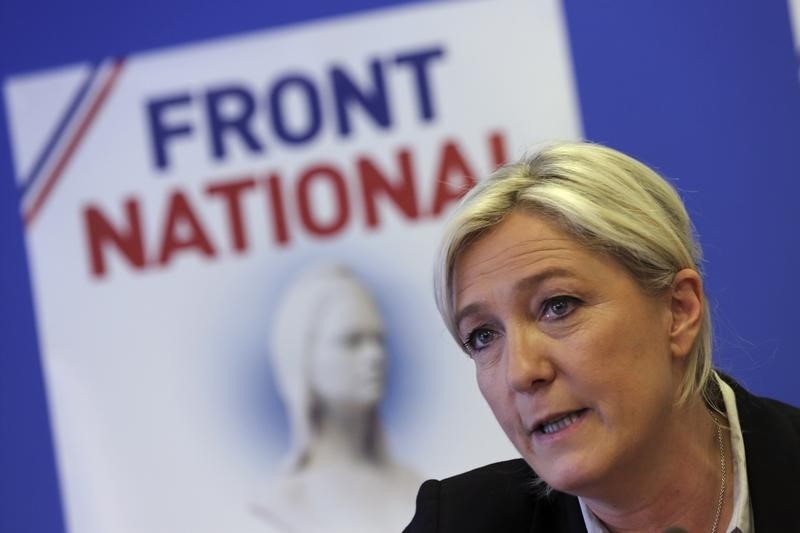We wonder how the Swiss National Bank and Swiss Franc will respond if
- France leaves the euro
- The Bank of Franc starts monetizing debt
By Ingrid Melander, Leigh Thomas and Simon Carraud

Marine Le Pen © Reuters. France's FN sets out unorthodox economic plans to support a euro exit - Click to enlarge
PARIS (Reuters) – France’s National Front will combine the euro exit at the heart of its economic platform with a cocktail of unorthodox policies including money printing, currency intervention and import taxes, a top party official told Reuters.
A key measure in the presidential platform National Front (FN) leader Marine Le Pen will unveil this weekend will be to break France’s dependence on market financing by reserving the right to order the central bank to buy up its bonds.
All of this would require a major overhaul of French laws and would require not only Le Pen being elected president in May but also the FN winning parliamentary elections in June.
“The only way for the French economy to adapt itself to how the global economy is evolving is by getting its monetary and budgetary sovereignty back,” said Jean Messiha, who coordinates the drafting of Le Pen’s election platform.
Opinion polls see Le Pen as likely to top the first round of the presidential poll on April 23 but then lose the May 7 run-off to conservative Francois Fillon or centrist Emmanuel Macron.
But in a race that is turning out to be the most unpredictable France has known in decades, the FN hopes this weekend’s rally in Lyon, where Le Pen will spell out her electoral agenda, will help convince voters who have traditionally backed mainstream parties to give her a chance.
“The FN’s program explicitly foresees re-establishing the possibility for the French state to refinance itself at the Bank of France,” Messiha said, referring to what is essentially printing money to finance public spending.
The FN considers that “by breaking the financial market’s monopoly, you will automatically lower the cost of (borrowing) money,” he said.
Most major central banks are banned from buying their government’s debt directly, partly because of concerns the mass creation of liquidity to buy them would unleash a surge of inflation.
“One shouldn’t obsess over inflation,” said Messiha.
“Re-establishing monetary financing of the treasury wouldn’t mean that we would from one day to the next print tonnes of liquidity to inject into the economy,” he said, adding that this would just be a possibility to be used if needed.
A return to the franc would mean all of France’s existing public debt of about 2 trillion euros ($2.15 trillion) would be redenominated in the new currency, Messiha said.
“There will be safeguard measures that will ensure France’s debts are honored and no one will lose anything,” he said, adding that a “massive state guarantee” would ensure businesses can still borrow on markets as the transition takes place.
Asked how either would work, and how capital flight could be prevented, he offered few details except that central bank reserves would be used to defend the new French currency.
Le Pen’s Lyon election program of some 140 “presidential commitments” will confirm she plans to open six months of negotiations to take France out of the euro. She would also reinstate border controls and essentially seek an overhaul that would reduce the European Union to a very loose cooperative of nations.
“Our preferred scenario would be to agree jointly on the dismantling of the euro zone,” Messiha said.
If that did not work, an FN government would seek a unilateral exit from the single currency by putting it to a referendum. Polls show the French would probably reject a “Frexit”.
To rebuild France’s industrial base, sellers of imported goods would not be allowed to pass on all of the value-added sales tax to consumers as they do now, creating a levy resembling an import tax.
The FN also wants to force retailers to hold a certain percentage of French goods on their shelves depending on how much of any given product can realistically be made locally, Messiha said.
France, whose borrowing rates have benefited from being member of the euro zone, financed its debt at historically low rates last year as yields were dragged down across the bloc.
Full story here Are you the author? Previous post See more for Next postTags: Marine Le Pen,newslettersent






































1 comment
zoran
2017-02-03 at 22:28 (UTC 2) Link to this comment
http://www.counterpunch.org/2017/02/03/unspeakable-the-black-book-of-imperial-terrorism/